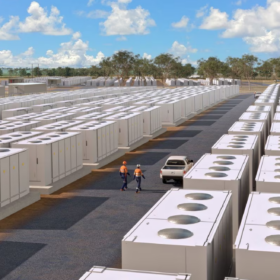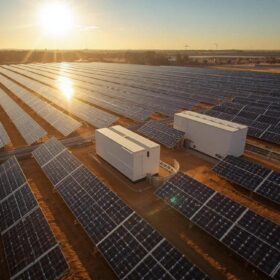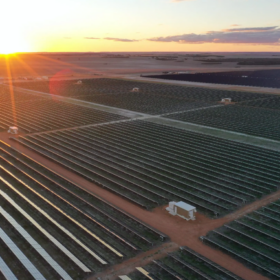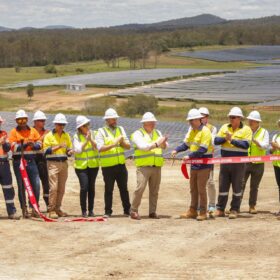The surge in charging was driven by the initial energisation and functional testing of SEC’s giant battery project, the Melbourne Renewable Energy Hub in Plumpton.
Co-owned by SEC and Equis Australia, the Hub is gearing up to deliver 1.6 GWh of storage when it comes fully online later this year – enough to power 200,000 homes during the evening peak period.
Energising the project’s 444 battery units is a critical step in deploying a grid-scale battery energy storage system.
The process involves various tests to ensure that the battery units operate safely within their technical parameters.
It’s the first time Victoria’s growing portfolio of big battery storage facilities has achieved a combined charging rate of more than one gigawatt — making it the first state in Australia to do so.
Victoria has nine big batteries in operation and several under construction.
SEC Chief Executive Officer Chris Miller said energisation was a crucial step as the Hub gears up to enhance Victoria’s electricity network and support SEC’s position in the retail market by firming renewable electricity supply.
“We know storage is critical for Victoria’s energy transition, and this project adds significant storage capability to the grid,” Mr Miller said.
“SEC’s investment in the Melbourne Renewable Energy Hub was pivotal to the delivery of the project, enabling construction to begin and for one of the project’s three big batteries to be upscaled from two to four hours of storage.”
The Hub’s energisation and testing process will continue over the coming weeks.
The Hub will charge when renewable energy is abundant and discharge when supplies are low. By soaking up surplus rooftop solar and energy from the grid, the battery will help reduce power prices.
The Hub’s construction has created jobs and training opportunities for more than 1,200 people, including over 70 apprentices, cadets and trainees.






By submitting this form you agree to pv magazine using your data for the purposes of publishing your comment.
Your personal data will only be disclosed or otherwise transmitted to third parties for the purposes of spam filtering or if this is necessary for technical maintenance of the website. Any other transfer to third parties will not take place unless this is justified on the basis of applicable data protection regulations or if pv magazine is legally obliged to do so.
You may revoke this consent at any time with effect for the future, in which case your personal data will be deleted immediately. Otherwise, your data will be deleted if pv magazine has processed your request or the purpose of data storage is fulfilled.
Further information on data privacy can be found in our Data Protection Policy.